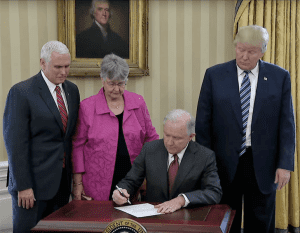 Late last month, Attorney General Jeff Sessions issued an official memo that has raised significant concerns for those interested in protecting the rights of Department of Justice whistleblowers. The memo dated Jan. 29, 2018 forbids department heads within the agency that he runs from speaking with “senators, representatives, congressional committees or congressional staff” without first notifying the agency’s Office of Legislative Affairs and apprising them of their intended communication.
Late last month, Attorney General Jeff Sessions issued an official memo that has raised significant concerns for those interested in protecting the rights of Department of Justice whistleblowers. The memo dated Jan. 29, 2018 forbids department heads within the agency that he runs from speaking with “senators, representatives, congressional committees or congressional staff” without first notifying the agency’s Office of Legislative Affairs and apprising them of their intended communication.
Though the Attorney General’s stated reason for issuing the official memo is the protection of the department from the “culture of leaking,” his instructions may, in fact, be illegal, as the Department of Justice’s employees have the legal right to “make protected disclosures directly to Congress.” The law that was specifically created to protect whistleblowers goes so far as to explicitly state that any nondisclosure agreement or contract that a Department of Justice employee is asked to sign must clearly delineate the fact that there is an exception for whistleblowing communication.
Whistleblower laws were written with the intention of freeing employees and others with insider knowledge to report observed fraud and corruption. The laws not only reward people for coming forward but also make it illegal for any kind of retaliatory acts to be taken against the person who has come forward once their identity is revealed. Senator Charles Grassley has long been an advocate of whistleblower rights and answered the memo from Sessions with a firmly worded response warning that it “could leave the impression that the agency is attempting to prevent lawful disclosures and discourage employees from exercising their statutory and constitutional rights to directly communicate with Congress.”
The recent memo was not Sessions’ first salvo at whistleblowers. In August 2017, he announced an escalation in his agency’s crackdown on what he called “leakers” following the release of information embarrassing to the administration to journalists. Whistleblower advocates immediately pushed back, pointing out that Sessions had failed “to distinguish between whistleblowing in the public interest and other leaks.”
Whistleblower protections provide people in many different industries the opportunity to act on behalf of the nation to put a stop to fraudulent actions. No matter the reason for Sessions writing the memo, the threats that his actions represent put those working at the Department of Justice in a difficult position.
If you are aware of wrongdoing or fraud that needs to be reported, you need to know the specific rules regarding the process in order to protect your rights. Contact the experienced whistleblower attorneys at Bochetto & Lentz today to learn more.
